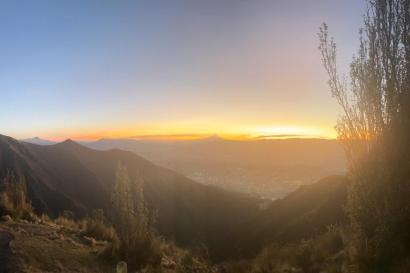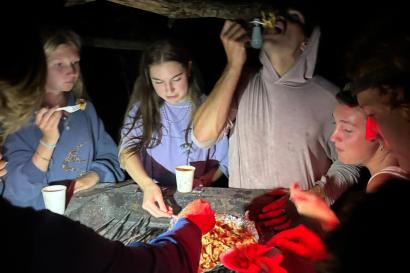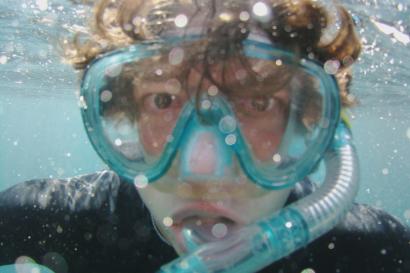People have asked me a couple times throughout my year abroad if I’d ever live in Latin America, and most of the time I’ve responded with uncertainty. Until I went to Cuenca. For one of my last weekends in Ecuador, a friend and I hopped in a 15-passenger van and ventured the bumpy roads down to the country’s third largest city. Cuenca is a dream of a place. Situated at the foothills of the southern Ecuadorean Andes, the city is a large, yet tight-knit town filled with red rooves, colonial buildings, and beautiful art. The first day was rainy, but I could still feel the beaming bright energy of the place. My friend and I strolled along the river that runs through town, hung out in the grass and sniffed the flowers, ate vegan food, went to art museums, and bathed in mineral hot springs from the mountains. It’s almost comical how picturesque and perfect our time was there.
No, really - many Ecuadoreans will tell you that Cuenca is one of the best cities in the country—much better than Quito. Don’t get me wrong —Quito has a special place in my heart, given I called it home for four months and had such a wonderful host family and time at Universidad San Francisco de Quito. But Cuenca is a true gem of Ecuador. Indeed, it’s a very popular place for Americans to retire, given its beauty, Ecuador’s use of the dollar, and its cheaper cost of living compared to the United States. I had heard this before going, but after actually spending time in Cuenca, I totally understood its appeal. I even daydreamed about doing it myself when I grow old.
One of the many pros of the city is that it sits just a few miles away from one of the country’s finest national parks—Cajas. Our second day in Cuenca my friend and I, along with two German girls from the hostel we were staying at, took an hour-long bus ride into the park. As the bus rolled up to the visitor’s center, we marveled at the green, mossy, webby terrain and the dome-like hills that spread across the park. We skipped down to the trail near the lake, following the wooden posts marked in red and started our loop around the park. We even ran into another friend from the hostel—an Argentine guy who I bonded with over our experiences in Buenos Aires and around Latin America. The weekend was filled with nice coincidences like this—something that started to happen to me more often in my last few weeks in Ecuador.
I loved Cuenca so much, halfway through the trip I told the hostel to write me in for another night. I’d stay till Monday night instead of Tuesday night, since I only have one class that’d I’d have to skip on Monday (sorry Mom). My friend cried out in lament about having to leave Sunday, since she had already missed so much school the week prior when her boyfriend was in Ecuador. However, soon we learned that classes would be cancelled on Monday, so neither of us would have to miss class and we could now both stay one more day in this city we had fallen in love with.
However, the reasons for which classes were cancelled that Monday brings me to showcase the realities of what it’s actually like to live in Latin America. Meaning, the contrast between these dreamy-like experiences we may have as Americans travelling in places like Cuenca and the experiences of people that spend their whole lives there. Classes were cancelled because the founder of the Universidad San Francisco de Quito died after being hit by a bus and the medical services didn’t arrive in time to save his life. It was pouring rain in Quito, as it often does there, so while covering his head and running across the street, neither the bus driver nor Santiago, the founder, saw each other.
Now that’s not to say that accidents like this one don’t happen back in the US or other countries of the “Global North,” but it has been shocking how many brutal accidents I have witnessed during my time in Ecuador. Accidents which are at the bottom of the list of quality-of-life concerns that people in Ecuador now have.
The main daily concern of most Ecuadoreans at the moment is security. In recent years, homicide rates and other crimes have skyrocketed, to the point that many Ecuadoreans have changed their lifestyle because of it. One night after my host family had a party, many of their friends went home much earlier than usual, since people are concerned about driving home at night—even if they live close-by. Additionally, many people, including international students, have gotten their belongings stolen while out on the street. I too, was robbed in the streets of Brazil last year, but I mostly attributed it to my fault, since we were out in a neighborhood in which people had told us to be careful and I wasn’t paying enough attention. I still think my phone might even have been in my back-pocket—an easy target for robbers and a common-sense understanding of travelers. But it was very late at night and there were lots of fun distractions. I learned my lesson, I told myself. However, I really started to see things differently when I learned another exchange student was robbed in broad daylight in Cumbayá—the suburb where the university is located and where I live, and also one of the wealthiest neighborhoods near Quito. I never expected it to happen to anyone in Cumbayá, in broad daylight for that matter, with threats involved.
Given security is one of the main political concerns for Ecuadoreans now, just a few weeks ago the president even legalized the carrying of guns. It certainly caused a lot of outrage, at least in my liberal circles, but it sparked an interesting discussion and was a big moment of reflection during my time in Ecuador. Obviously as an American, I am used to the gun control debate, but in Ecuador, its relatively newer territory. Territory that comes with the political context of left-wing president Rafael Correa’s abandonment of the U.S. military base on the coast of Ecuador, the ensuing increase in drug trafficking, and the age-old struggle against inequality in Latin America.
As I am wrapping up my time in Ecuador, and my entire year in Latin America (I studied with IES Abroad in Argentina last semester, without going home in between), I am left feeling more aware of this lifelong internal conflict I have had with my privilege. On one end, I am incredibly grateful for the truly beautiful experiences I have had traveling—for the adventures I have taken, the wonderful friends I have made, and the many things I have learned. However, I am also aware that the beauty of my experiences is partly enabled by my position as a privileged woman from United States.
All of this has culminated to the past few days, where the day I left Ecuador, filled with immense joy, gratitude, and love for the experiences I have had this year, the U.S. State Department issued a new travel advisory to exercise increased caution. That day, the president of Ecuador, Guillermo Lasso, dissolved the Congress and is now essentially acting as an autocrat after the Congress impeached him earlier this year and the government has been in deadlock. The State Department expected major protests, and therefore told all U.S. citizens to be extra vigilant. Also, this past week, it issued a travel advisory to reconsider travel to Colombia which is also facing rising crime rates, even as the country has become a new major tourist destination in the past few years after the 2016 peace accords with the FARC. This happened just as I was traveling to Medellín to take a final solo trip for myself to commemorate my year abroad and my graduation.
Amidst all this chaos, I truly feel that my year in Latin America was the most gratifying experience of my life. I think it offers so many advantages for students who may be choosing where to study abroad and may be leaning towards just going to Europe like everyone else. While safety is obviously of upmost priority, these political situations often change—coming in cycles over the months and years. I am lucky that nothing grave happened to me abroad, but it is also likely for any traveler going to Latin America that exercises reasonable caution to be totally safe. Living in Latin America, and truly experiencing my reality in contrast to the realities around me, has been one of the most valuable parts of my education and development into the person I am today. This is why I study abroad. This is why I travel.
Editor's Note: Student Health & Safety is our number one priority at IES Abroad. Our highly trained crisis management team both at our headquarters in Chicago and on-site are monitoring situations on the ground as they arise. If you have any questions or concerns about health and safety while abroad, please contact the staff at your Center abroad. Students with questions about health and safety before they depart should contact the Dean of Students Office at 800.995.2300.



Elise Fuente
My name is Elise Fuente and I'm a senior at The George Washington University in Washington, DC. I'm studying International Affairs with a concentration in International Development and I have a keen interest in Latin America. I'm studying in Quito after a semester in Buenos Aires and I hope to keep exploring the region as much as possible! I have passion for sustainability, service, languages, and the outdoors, but sometimes I still dream about being a chef. :)










